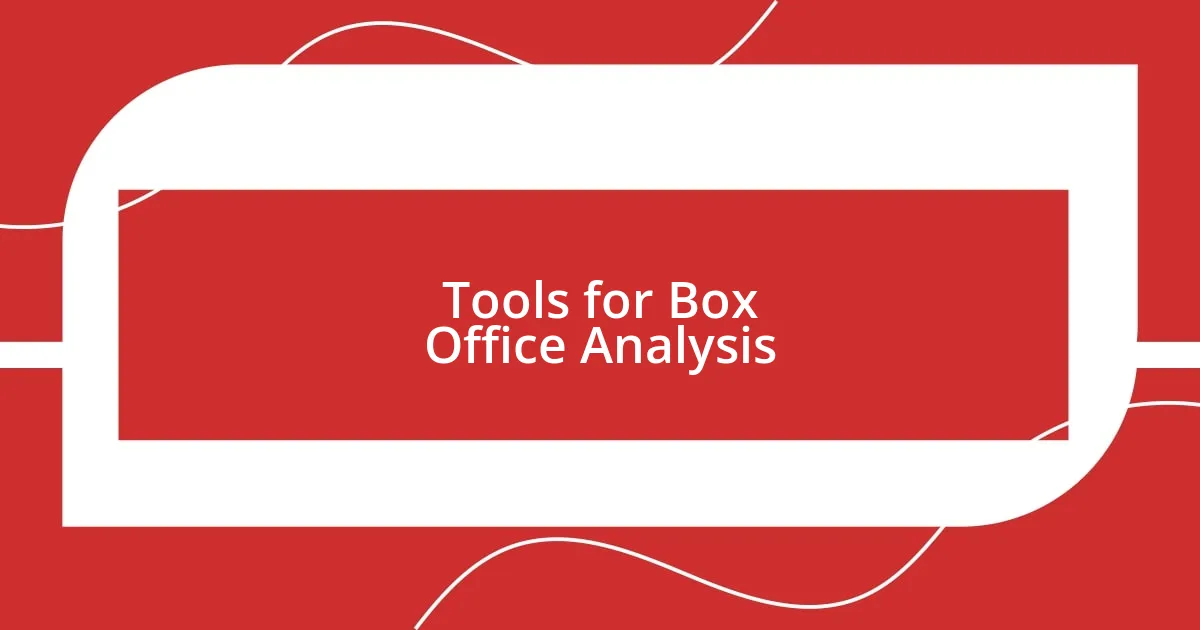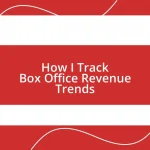Key takeaways:
- Opening weekend predictions are influenced by factors like marketing strategies, star power, and audience sentiment, making them both exciting and unpredictable.
- Franchise films tend to dominate box office sales, but unexpected indie hits can also emerge due to grassroots marketing and viral trends.
- Being adaptable and engaging with audience sentiment and industry insights are crucial for making accurate predictions.
- Utilizing data analysis tools and social media feedback helps refine predictions and capture the evolving dynamics of film reception.

Understanding Opening Weekend Predictions
Opening weekend predictions can often feel like a knife’s edge—so much anticipation, yet so much uncertainty. I remember the exhilaration leading up to a major film’s release; it was a blend of excitement and anxiety, with predictions buzzing through the air like fireworks. Did I really believe those numbers would translate into box office success? Sometimes, my gut told me yes, and other times, I felt the doubt creeping in.
When looking at these predictions, it’s essential to consider multiple factors, such as marketing efforts, star power, and audience sentiment. I’ve often found myself analyzing trailers and social media buzz to gauge what might resonate with the audience. Have you ever caught yourself scrolling through a movie’s Twitter feed, absorbing the chatter, and thinking, “This is going to be huge!”? That collective excitement can sometimes skew our expectations, but it’s that very energy that plays a significant role in shaping the opening weekend.
Another crucial aspect is comparing similar theatrical releases. Reflecting on my experiences, I often thought, “If this film mirrors last year’s hit, then maybe the predictions hold water.” Yet, every film carries its soul, and phenomena like word-of-mouth can dramatically influence turnout in ways that statistics can’t predict. That’s what keeps this industry so dynamic and, frankly, heart-pounding.

Factors Influencing Box Office Performance
When it comes to box office performance, marketing strategies are vital. I still remember the marketing blitz surrounding a summer blockbuster I was eagerly anticipating. It had ads everywhere—billboards, TV spots, and clever social media campaigns. I was part of the buzz, sharing trailers with friends and expressing my excitement online. This interconnectedness fueled momentum, proving that an effective marketing plan can significantly impact opening weekend numbers.
Star power can’t be overlooked either. There have been times when I’ve rushed to catch a film purely because my favorite actor was in it. I felt a sense of anticipation that was almost tangible. That recognition can often guarantee a certain level of ticket sales, as fans flock to theaters. However, I’ve also seen films that fell flat despite a star-studded cast, demonstrating that audience connection matters just as much as the names on the marquee.
Audience sentiment, influenced heavily by early reviews and social media chatter, is an unpredictable but powerful element. I recall feeling torn over a film after watching an early screening. While some friends were all in, others voiced strong reservations based on hidden spoilers and critiques. That shift in perspective reminded me that what the audience feels can sway box office numbers in surprising directions, sometimes making or breaking a film’s success.
| Factor | Influence on Box Office |
|---|---|
| Marketing Strategies | Drives audience anticipation and visibility |
| Star Power | Can guarantee initial ticket sales based on fan loyalty |
| Audience Sentiment | Early reviews and social media influence turnout |

Analyzing Past Opening Weekend Trends
Analyzing past opening weekend trends reveals fascinating patterns that can be quite illuminating. I often find myself reminiscing about those early-morning box office reports, eagerly analyzing whether a film hits or misses its mark. There’s something thrilling about that first reaction from audiences—the anticipation in theaters, the palpable energy as everyone waits to see if a movie lives up to the hype. I remember being part of a crowded screening for a franchise film that broke records, and the collective cheer when the opening credits rolled is still fresh in my memory.
Here are some trends I’ve noticed:
- Franchise Films Dominate: Establishing brands often guarantee higher opening weekend sales, as loyal fans show up to support their beloved stories.
- Surprise Hits: Occasionally, smaller, indie films catch fire due to grassroots marketing or unexpected viral moments, proving that breakthrough success can materialize overnight.
- Seasonality Matters: Certain times of the year, like summer and the holiday season, see enhanced box office performance because families are looking for entertainment.
On the flip side, analyzing trends can also highlight where predictions can misfire. I vividly recall the buzz around a highly anticipated sequel that fell flat despite optimistic forecasts. As the credits rolled, I was struck by the disappointment in the audience’s muted reactions. It was a harsh reminder that, despite all the analytics and predictive models we rely on, ultimately, the heart of the audience is the ultimate judge of success.
- Negative Reviews Can Sink Movies: Even the most well-promoted films can falter if early reviews are unfavorable.
- Competition Can’t Be Ignored: I’ve seen potential hits struggle when competing against established blockbusters, highlighting the fierce market dynamics at play.
- Social Media Backlash: The power of instant reactions can create a wave that shifts audience perceptions overnight, impacting ticket sales in real-time.

Strategies for Making Accurate Predictions
When crafting accurate predictions, it’s crucial to analyze historical data with a discerning eye. I often find myself poring over previous box office numbers, trying to identify patterns that might hint at potential outcomes. For example, I noticed that certain genres like superhero movies tend to thrive on opening weekends, leading me to wonder—what is it about their storytelling that captivates audiences so strongly right from the start?
Engaging with industry insiders can provide invaluable perspectives. One time, I had a discussion with a colleague working in film marketing, and she shared insights about how strategic release dates can really alter a film’s reception. It made me realize that, sometimes, it’s not just about the movie itself, but the environment in which it’s launched. Have you thought about how much a holiday weekend can influence the numbers?
Ultimately, I believe that keeping an eye on audience sentiment, actively participating in social media dialogues, and staying updated with industry news are integral strategies for making accurate predictions. I remember sharing my reservations about a film in a group chat, and the ripple effect of that discussion influenced our plans for the weekend. It’s fascinating how our conversations can shape expectations and, consequently, ticket sales. Engaging with the audience feels like a barometer for measuring anticipation—one that no analytic tool can fully capture!

Tools for Box Office Analysis
When it comes to box office analysis, I have come to rely heavily on platforms like Box Office Mojo and The Numbers for their comprehensive data tracking. I’ve spent countless evenings diving into these resources, tracking not just grosses but also demographic information and trends. There’s something empowering about visualizing data in trends. It paints a clearer picture of what audiences respond to, and that’s invaluable for making informed predictions.
I also appreciate social media sentiment analysis tools, which provide a real-time pulse on audience reactions. I remember using one such tool before the opening of a highly anticipated film that was generating buzz across platforms. It was fascinating to see how excitement ebbed and flowed with each new promotional release. Have you ever noticed how a tweet or a meme can sway public opinion almost overnight? It reinforces the idea that gauging audience sentiment is just as important as analyzing the numbers.
Lastly, I often turn to historical performance metrics to compare similar films. Comparing a new release to others in its genre or with similar themes can offer crucial insights. For instance, when I followed the release of a nostalgic romance film, I looked back at similar movies from the past decade. The patterns were telling; it made me think about how nostalgia plays a role in drawing audiences back to theaters. Each analysis feels a bit like piecing together a puzzle—I love that moment of clarity when everything clicks into place!

Lessons from My Predictions
Reflecting on my prediction experiences, I found that overconfidence can be my biggest pitfall. There have been times when I was absolutely certain a film would flop, only to witness it soar at the box office. I remember a particular instance with a feature that, on paper, seemed too niche to succeed. Who knew that audiences would latch onto its unique premise in such a big way? It emphasized to me the unpredictability of taste and trends.
Another lesson I’ve learned is that predictions can be significantly swayed by marketing efforts. I recall a summer release whose promotional campaign was absolutely everywhere. My initial skepticism turned to excitement when I saw how effectively it captured the audience’s interest online. It made me wonder—how often do we underestimate the power of a strong marketing push? Understanding this dynamic can shift my perspective on how a film will perform.
Finally, I’ve realized the importance of being adaptable. After a season of analyzing box office results, I sometimes find myself needing to reevaluate my strategies. One weekend, I anticipated that a sequel would dominate, only to see a smaller indie film capture hearts instead. This taught me to stay flexible and open-minded—adapting my predictions based on the ever-evolving landscape of cinema can elevate my forecasting skills considerably. How often do we allow ourselves to pivot in the face of new information? Embracing that change can lead to surprising and enriching insights.

Tips for Future Opening Weekends
When gearing up for future opening weekends, I’ve found that early preparation is key. I spent a week before the release of a film assembling a detailed calendar that included key dates for marketing releases, sneak peeks, and social media campaigns. This level of foresight helped me anticipate audience reactions; it was almost like having a backstage pass to the excitement building around a film. Have you ever felt that buzz when everything is just falling into place?
Another valuable tip is to engage with online communities. When I connected with film enthusiasts on forums and social media, I gained fascinating insights into what they were excited about. I remember asking a group about their thoughts on an upcoming blockbuster, and their passion revealed trends I hadn’t considered. It made me realize that sometimes, the real pulse of the audience lies beyond the data.
Lastly, always be ready to pivot based on real-time feedback. At one point, I was adamantly convinced a particular sequel would overshadow everything else that weekend. But as new reviews rolled in, I noticed a shift in sentiment. Instead of clinging to my original prediction, I took a step back, recalibrated my expectations, and it paid off. I learned that embracing uncertainty is often the best way to refine our predictions. How do you approach shifts in public opinion when they challenge your expectations?















